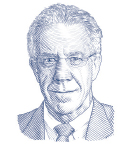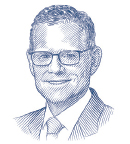The COVID-19 pandemic has underscored that public health is the product of one global, integrated ecosystem.
Although it is tempting to focus on specific aspects of local health-care systems, or the political or physical environment, health and health care in other countries also impacts the United States in many ways, with implications for our residents. This connection holds true for both communicable and noncommunicable diseases, including cancer. As leaders of major organizations dedicated to eradicating cancer, it is increasingly clear to us that reducing the U.S. cancer burden is dependent on concurrent, coordinated strategies at the global level, to better understand the biology and epidemiology on a broader scale, and as well the need to develop widely applicable approaches to screening and treatment.

Karen E. Knudsen, MBA, PhD

Lawrence N. Shulman, MD, FASCO

Clifford A. Hudis, MD, FACP, FASCO
“It is increasingly clear to us that reducing the U.S. cancer burden is dependent on concurrent, coordinated strategies at the global level.”— KAREN E. KNUDSEN, MBA, PhD, AND COLLEAGUES
Tweet this quote
It is important to note that while we have made measurable progress, the global cancer burden is still significant and growing. One in two men and one in three women in the United States will develop cancer over their lifetimes. In 2023, it is estimated that more than 1.9 million patients will be diagnosed with cancer, and there will be more than 600,000 cancer deaths.1 The United States has realized a 33% decline in cancer mortality since 1991,1 reflecting successes from sustained investments in cancer research. Yet the burden of morbidly and mortality remains substantial. That is one reason that accelerating such progress to reduce the cancer burden is a national priority under President Biden’s reignited Cancer Moonshot initiative.
This progress stands in stark contrast to the current global state, where many countries are experiencing increasing cancer incidence and mortality rates. Between 2020 and 2040, new global cancer cases are expected to increase from approximately 19 million annually to 30 million each year,2 and cancer deaths from nearly 10 million to more than 16 million each year, nearly 70% of which will occur in low- and middle-income countries.3
Cancer Research: A Global Endeavor
Cancer is more than 200 distinct diseases, each with a unique cause and behavior, sometimes varying across racial/ethnic populations. That is why research including large and ethnically diverse populations can enable a better understanding of cancer biology, and the more rapid development of substantive, more broadly effective and impactful discoveries for U.S. citizens as well as those in other countries.
Currently, most cancer research is conducted in high-income countries and is therefore skewed toward the diseases and racial/ethnic groups most common in those areas. For example, research conducted in high-income countries is less likely to focus on head and neck cancer, certain blood cancers, and cervical cancers, which are more prevalent in low- and middle-income countries. Yet, illustrating the global impact, these malignancies are also predicted to increase in the United States based on population growth patterns. Studying these diseases now helps prepare higher-income countries for their future challenges.
Worldwide Benefits From International Collaboration
Increased support for global cancer research would be expected to accelerate progress in both cancer prevention and cancer treatment in the United States and beyond as has already been demonstrated. For example, scientists in Costa Rica partnered with the U.S. National Cancer Institute to conduct a human papillomavirus (HPV) vaccine trial in the mid-2000s, which suggested that effective vaccination against HPV-driven cancers such as cervical and head and neck cancers might be achieved with a single inoculation. This is a more feasible approach in the United States as well as elsewhere; it saves time, money, and lives globally as well as helps to make the elimination of HPV-associated cancer a global possibility. Expanding international collaboration will lead to faster treatment advances, delivering benefits today and in the future.
Global Cancer Collaborative
The Global Cancer Collaborative is a group of academic, non-profit, and US government cancer leaders who want to work together to improve cancer incidence and mortality rates worldwide. The group is led by Dr. Lawrence N. Shulman from the University of Pennsylvania and Dr. Karen E. Knudsen from the American Cancer Society, and includes representatives from the American Association for Cancer Research (AACR), the American Society of Clinical Oncology (ASCO), the American Society for Clinical Pathology (ASCP), the American Society for Radiation Oncology (ASTRO), the Access to Oncology Medicines (ATOM) Coalition, the National Comprehensive Cancer Network (NCCN), the National Cancer Institute (NCI), the Society of Surgical Oncology (SSO), the Oncology Nursing Society (ONS), the Advanced Practitioner Society for Hematology and Oncology (APSHO), and Research!America.
University of Pennsylvania - Dr. Lawrence N. Shulman
ACS - Dr. Karen E. Knudsen
ACS - Dr. Arif H. Kamal
AACR - Dr. Margaret Foti
AACR - Dr. David Tuveson
ASCO - Dr. Clifford A. Hudis
ASCO - Dr. Julie R. Gralow
ASCP - Dr. E. Blair Holladay
ASTRO - Dr. Geraldine Jacobsen
ASTRO - Dr. Jeff M. Michalski
ATOM - Dr. Dan Milner
NCCN - Dr. Robert W. Carlson
NCCN - Dr. Wui-Jin Koh
NCI - Dr. Satish Gopal
SSO - Dr. Russell Berman
SSO - Dr. Aaron Saunders
ONS - Brenda Nevidjon
APSHO - Wendy Vogel
Research!America - Eleanor Dehoney
With special thanks to Drs. Doug Tyler and Chandra Are from SSO for their participation.
Innovations in global cancer research also have the potential to transform cancer delivery in the United States and increase health equity, especially in rural and remote U.S. populations with reduced access to medical care. For example, innovations in hypofractionation radiation therapy, which allows for fewer days of radiation with no apparent negative effect on outcomes, were evaluated in the global setting and are now becoming a new standard of care in the United States. This globally derived approach has been shown to reduce the burden of treatment on patients in the United States, improve treatment adherence, and decrease health-care costs, an important goal as we move towards value based cancer care in general.
Innovations in the development of radiation therapy equipment have yielded less expensive hardware with lower energy requirements and maintenance costs. This increases feasibility and accessin global low-resource settings as well as in the United States. Similar examples exist for other aspects of cancer care, including surgery, systemic therapies, pathology, and radiology.
The U.S. public and our politicians are united in seeking more resources and support for faster progress against cancer, and it is our belief that supporting cancer research through global collaboration would serve as a catalyst toward this goal. A survey examining U.S. citizens’ views on U.S. spending on health in developing countries found that nearly 70% of respondents said the United States should collaborate with those countries to improve health.4 And while nearly half of those surveyed believe that the percentage of the federal budget spent on foreign aid focused on health care exceeds 20%, the reality is that it has consistently been less than or equal to 1%! Clearly the public wants more done and is willing to fund it.
These results are consistent with longstanding observations. When it comes to cancer, a recent national public opinion poll found that nearly 90% of respondents believe it is important for the U.S. government to spend substantial funds for research, and more than half think the federal investment in cancer research is too little.5
Like the rest of health and health care, cancer is neither political nor confined by geography, and our ability to reduce the overall cancer burden in the United States is inextricably tied to the worldwide state of cancer research and care. We urge increased commitment to combat the global cancer burden through support and collaboration of U.S. and international programs to expand and advance cancer research, the oncology workforce, and clinical care delivery globally.
DISCLOSURE: Dr. Knudsen reported research grant funding from Celgene, Sanofi, Novartis, and CellCentric, and consulting fees from CellCentric, Sanofi, Celgene, Janssen, and Genentech. She is employed by the American Cancer Society, which receives grants from private and corporate foundations. Dr. Shulman reported research grant funding from the Breast Cancer Research Foundation and consulting fees from Genentech. Dr. Hudis reported no conflicts of interest.
Disclaimer: This commentary represents the views of the author and may not necessarily reflect the views of ASCO or The ASCO Post.
REFERENCES
1. Siegel RL, Miller KD, Wagle NS, et al: Cancer statistics, 2023. CA Cancer J Clin 73:17-48, 2023.
2. Sung H, Ferlay J, Siegel RL, et al: Global cancer statistics 2020: GLOBOCAN estimates of incidence and mortality worldwide for 36 cancers in 185 countries. CA Cancer J Clin 71:209-249, 2021.
3. Pramesh CS, Badwe RA, Bhoo-Pathy N, et al: Priorities for cancer research in low- and middle-income countries: A global perspective. Nat Med 28:649-657, 2022.
4. DiJulio B, Norton M, Brodie M: Americans’ views on the U.S. role in global health. Available at https://www.kff.org/global-health-policy/poll-finding/americans-views-on-the-u-s-role-in-global-health/. Accessed February 15, 2022.
5. The Harris Poll: ASCO 2018 Cancer Opinions Survey, October 2018. Available at https://old-prod.asco.org/sites/new-www.asco.org/files/content-files/research-and-progress/documents/2018-NCOS-Results.pdf. Accessed February 15, 2022.
Dr. Knudsen is Chief Executive Officer of the American Cancer Society. Dr. Shulman is Director of the Center for Global Cancer Medicine at the Abramson Cancer Center at the University of Pennsylvania. Dr. Hudis is Chief Executive Officer of ASCO.

